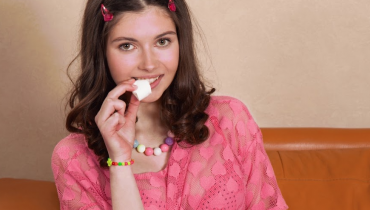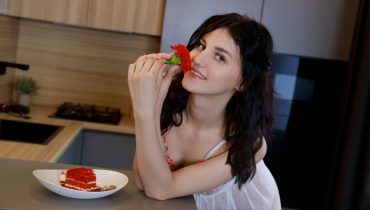When Maia Cross was 45, she found herself constantly catching colds. A sore throat would linger, her energy felt depleted, and even minor stress seemed to trigger weeks of fatigue. “I thought it was just age,” she recalls, “but I realized I was feeding my immune system the wrong way.”
That realization became the turning point of her health journey — and the birth of her “Clean Immune Method,” a philosophy rooted in clean eating and mindful nourishment. Today, Maia’s story has inspired thousands to rethink not only what they eat but how they live. Her approach blends science and simplicity: whole foods, balanced nutrients, and the discipline of consistency.
The Turning Point: When Food Becomes Medicine
Maia’s transformation began after a viral infection left her bedridden for two weeks. Her doctor mentioned her immune system might be weakened by chronic inflammation and nutrient deficiencies. Curious and determined, she dove into research, discovering studies from the National Institutes of Health (NIH) showing how diet directly influences immune cell activity and inflammation markers.
“I had been eating plenty,” Maia says, “but not what my body needed.” Processed foods, sugary drinks, and convenience meals had become her staples. By eliminating artificial ingredients and focusing on fresh produce, lean proteins, and healthy fats, she began to notice subtle yet powerful changes — deeper sleep, steadier energy, and fewer sick days.
Her story echoes the medical findings of the Harvard Health, which emphasizes that the immune system relies on a steady intake of micronutrients such as zinc, selenium, iron, and vitamins A, C, D, and E. Clean eating, as Maia learned, wasn’t a restrictive diet — it was nourishment in its purest form.
What “Clean Eating” Really Means
In the world of wellness trends, “clean eating” can sound vague or even elitist. Maia redefined it with humility and accessibility. To her, clean eating is not about perfection — it’s about intention. “I don’t chase labels,” she explains. “I chase nutrients.”
She focuses on whole, unprocessed ingredients that deliver the most nutritional density per bite. A plate of colorful vegetables, grilled salmon, and quinoa is more than a meal — it’s a message to the immune system: you are supported. The Cleveland Clinic defines clean eating as consuming foods in their most natural state, rich in vitamins, minerals, and antioxidants while avoiding excessive additives, refined sugars, and trans fats.
Maia describes her pantry as “vibrant.” Fresh greens, citrus fruits, nuts, olive oil, and spices like turmeric and ginger — all staples of anti-inflammatory cuisine. “When you eat clean,” she says, “you don’t just reduce toxins. You increase vitality.”
The Science of Strength: How Clean Eating Protects Immunity
Modern immunology has shown that about 70% of the immune system resides in the gut. The Mayo Clinic notes that the balance of gut microbiota — the community of beneficial bacteria living in the digestive tract — plays a vital role in immune defense. Clean eating supports these microbes through fiber-rich foods, probiotics, and prebiotics.
Maia noticed her digestion improving once she eliminated refined carbs and added fermented foods like kefir and kimchi. “My skin cleared up, my energy stabilized — it was like my body was communicating again,” she recalls. Research from the WebMD underscores how gut health influences inflammation, hormone regulation, and even mood.
Clean eating also reduces oxidative stress, a process that damages cells when the body is overwhelmed by free radicals. Antioxidants from fruits like berries, and compounds found in leafy greens, help neutralize this damage, allowing immune cells to function efficiently. “It’s like giving your defense army fresh armor,” Maia says.
From the Inside Out: Emotional and Mental Renewal
For Maia, food was only one piece of the puzzle. Clean eating also became an emotional detox — a way to slow down and reconnect with her body. “When you choose ingredients consciously,” she reflects, “you begin to choose everything consciously — from your thoughts to your relationships.”
Research from Harvard Health confirms that diet influences mental health. Nutrient-rich foods like omega-3 fatty acids, folate, and magnesium support neurotransmitter balance, improving mood and cognitive resilience. Maia experienced this firsthand: fewer mood swings, better focus, and a calmer baseline of energy.
Her mornings transformed from rushed coffee and pastries to mindful rituals — green tea, oats with chia, and a gratitude journal. “That’s clean eating too,” she smiles, “because you’re cleaning your mind of chaos.”
The Role of Discipline and Joy
In her workshops for older adults, Maia emphasizes that sustainable wellness isn’t about punishment — it’s about rhythm. “Discipline and joy can coexist,” she says. “You can prepare roasted vegetables and still enjoy dark chocolate. Balance is the real secret.”
According to the Cleveland Clinic, emotional balance strengthens immunity by lowering cortisol — the stress hormone that can suppress white blood cell activity. When people find joy in healthy eating rather than guilt, their immune response improves naturally.
For Maia, joy came from rediscovering flavor. She began using herbs like basil, rosemary, and garlic not only for taste but for their antibacterial and antiviral properties. Garlic, she notes, became her “daily shield,” supported by findings from the NIH showing that allicin — a compound found in crushed garlic — boosts immune cell activity.
Living Clean in a Processed World
Maia admits that maintaining clean eating can feel overwhelming in a culture of convenience. “You can’t control every meal,” she says, “but you can control most of them.” Her strategy focuses on preparation: she preps vegetables on Sundays, keeps roasted chickpeas for snacks, and always carries a reusable water bottle. “Hydration is underrated,” she adds. “It helps flush toxins and supports immune function.”
Her approach aligns with advice from the Mayo Clinic, which emphasizes practical consistency over perfection. Even partial shifts — replacing white rice with brown, processed snacks with nuts, or sugary drinks with herbal tea — can significantly reduce inflammation and improve immune response.
“It’s not about a clean week,” Maia insists. “It’s about a clean life.”
The Ripple Effect: Clean Eating and Community Health
As Maia’s story spread, her philosophy inspired families, schools, and local wellness programs. During community workshops, she teaches that clean eating isn’t about luxury — it’s about accessibility and awareness. Simple steps, like buying seasonal produce or reading ingredient labels, can make a profound difference.
Her workshops often conclude with a group meal — a colorful, plant-forward menu that celebrates simplicity. “Food connects us,” Maia says. “And when that food is clean, that connection becomes healing.”
She also advocates for mindful cooking as a social act. “Cooking together restores something lost in modern life,” she explains. “It’s medicine for the body and the soul.”
The Long-Term Payoff: Strength Beyond Immunity
Today, Maia’s health metrics tell the story better than words. Her blood pressure is stable, her inflammation markers are low, and she hasn’t had a major illness in years. “But more importantly,” she says, “I feel strong.”
That strength is not just physical — it’s emotional, mental, and spiritual. Clean eating taught her patience, presence, and gratitude. She learned that the immune system isn’t an isolated organ — it’s a reflection of the whole self. “When you feed your body cleanly, you feed your life with clarity.”
The WebMD reinforces this holistic view, noting that diet, sleep, exercise, and stress management all intertwine to shape immunity. Maia’s journey embodies this balance — proof that wellness is built, not bought.
Final Reflection: Clean Eating as a Lifelong Dialogue
At 52, Maia Cross still treats every meal as a conversation with her body. She listens to its signals — hunger, fatigue, satisfaction — and responds with kindness. “Clean eating isn’t a rulebook,” she says softly. “It’s a relationship. One that gets stronger the more you nurture it.”
In a world full of diet noise, Maia’s voice remains calm and grounded. Her story reminds us that clean eating isn’t about the latest trend — it’s about trust: trusting food, trusting nature, and trusting ourselves.




























































